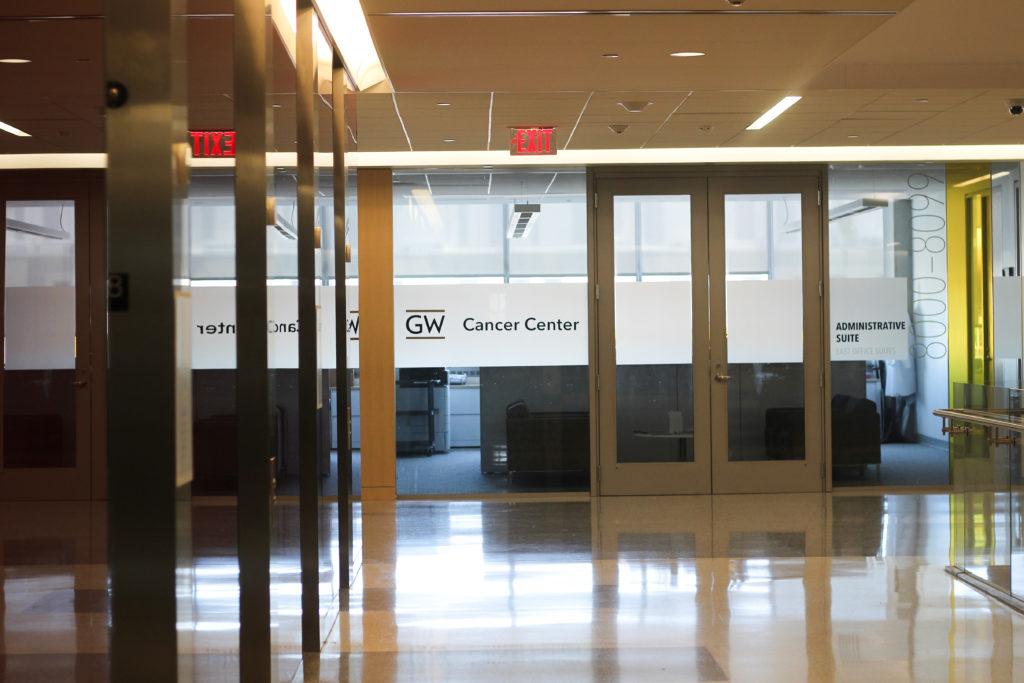Scientists from the Milken Institute School of Public Health and GW Cancer Center will host a symposium in the Marvin Center Friday to examine the relationship between lifestyle choices and cancer risk.
In partnership with the American Institute for Cancer Research, the symposium will feature six speakers presenting on the effects of factors like physical activity, obesity and diet on cancer risk. Cancer and nutrition scientists speaking at the symposium said the event will raise awareness about how the daily, routine choices people make can impact their odds of developing cancer.
Kim Robien, an associate professor of exercise and nutrition sciences at the public health school, said she began planning the symposium with Nigel Brockton, the American Institute for Cancer Research’s vice president of research, last September. She said presenters at the symposium will focus on policies that promote healthier food choices and physical activity to decrease cancer risk.
“The conference goals are to review the latest research on diet, physical activity and body composition in relation to cancer research and prevention, and help participants think about how to start moving these research findings into action,” Robien said in an email.
Conference organizers are promoting the event through local healthcare providers, professional organizations and social media. She added that depending on the turnout and reception to Friday’s event, organizers may hold similar events in the future.
Brockton, AICR’s vice president of research, said physicians working with cancer patients are sometimes unaware of how strong the evidence is linking risk factors like eating red meat or consuming alcohol to cancer, adding that the event will help inform health care providers.
“It still astonishes me that people actually very closely aligned in the field don’t know how strong the evidence is for certain risk factors and how prevalent they are,” he said. “So in that respect, this symposium is more about sharing information that’s already out there rather than conferences that tend to be more latest research results.”
He added that the public misidentifies the relative danger of certain factors that drive cancer incidence, citing how many people fear carcinogens in pesticides when research on diet choices has indicated a stronger link to cancer.
“The awareness part is really multi-pronged,” he said.
Brockton added that the one-day symposium, which GW staff and students can attend for a discounted rate of $25, is more affordable than conferences that often last multiple days. The full price of a ticket to attend the symposium is $50.
William Dietz, a Milken professor and the director of the school’s Sumner M. Redstone Global Center for Prevention and Wellness, will speak at the event about the relationship between obesity and cancer. He said he hopes the symposium will extend the conversation from treating cancer with more invasive techniques like chemotherapy to treating the disease with preventative steps like improving nutritional choices.
He said simple steps like reducing the consumption of processed meats and sugary drinks can minimize cancer risk, particularly when these recommendations come from doctors. But he added that even physicians have failed to see the link between the stigmatization of obesity and the obesity-cancer relationship, which is not “widely recognized.”
“A lot of providers don’t know how to open the conversation about it because it’s so stigmatized and because they often will blame patients for their obesity,” he said. “They think of obesity the way I think many people within the public think about obesity, that people with obesity are lazy or they lack self-control or they’re responsible for their obesity.”
Fang Fang Zhang, a cancer epidemiologist and Tufts University professor who has worked on research with AICR, said she hopes to push nutrition policy in her presentation at Friday’s symposium. She said she advocates for policies like taxing sweetened beverages and requiring products with high levels of added sugars to have warning labels that could create a large and sustainable shift toward healthier lifestyles.
“If we think about the cancer burden that can potentially be prevented – that’s what lifestyle factors can help prevent – it’s not a trivial percentage,” Zhang said.
Melinda Irwin, the associate director of Yale Cancer Center, will present at the event about the relationship between physical activity and cancer. Her presentation will focus on introducing exercise and weight management as a preventative tool to stave off cancer, likening the positive effect of these techniques on cancer risk to their effect on heart health.
“They are well-established cardiac rehabilitation programs that are often 12 weeks in duration. They’re often at hospitals or community-based organizations in the community and these are reimbursed by Medicare but also reimbursed by many third-party payers,” she said. “So why are we not yet there with cancer like we are with cardiovascular disease?”
Karen Collins, a nutrition adviser for AICR, said people are “inundated” with information about which food and lifestyle choices they should make, which can be “overwhelming.” Collins will discuss ways to implement AICR’s recommendations, like reducing red meat consumption and eating more whole grains, to allow symposium attendees to pick the most feasible changes for them.
“There are many paths to healthy eating and a physically active lifestyle,” Collins said. “What’s important is that each person finds one that fits them, that works for them, that they can make it a long term lifestyle.”




